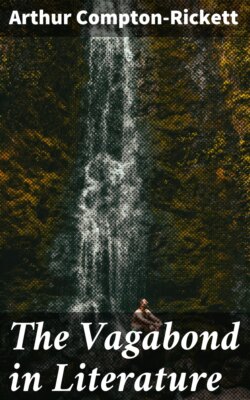Читать книгу The Vagabond in Literature - Arthur Compton-Rickett - Страница 7
На сайте Литреса книга снята с продажи.
III
ОглавлениеTable of Contents
But a passion for the Earth is not sufficient of itself to admit within the charmed circle of the Vagabond; for there is no marked restlessness about Mr. Meredith’s genius, and he lacks what it seems to me is the third note of the genuine literary Vagabond—the note of aloofness, of personal detachment. This it is which separates the Vagabond from the generality of his fellows. No very prolonged scrutiny of the disposition of Thoreau, Jefferies, and Borrow is needed to reveal a pronounced shyness and reserve. Examine this trait more closely, and it will exhibit a certain emotional coldness towards the majority of men and women. No one can overlook the chill austerity that marks Thoreau’s attitude in social converse. Borrow, again, was inaccessible to a degree, save to one or two intimates; even when discovered among congenial company, with the gipsies or with companions of the road like Isopel Berners, exhibiting, to me, a genial bleakness that is occasionally exasperating.
It was his constitutional reserve that militated against the success of Jefferies as a writer. He was not easy to get on with, not over fond of his kind, and rarely seems quite at ease save in the solitude of the fields.
Whitman seems at first sight an exception. Surely here was a friendly man if ever there was one. Yet an examination of his life and writings will compel us to realize a lack of deep personal feeling in the man. He loves the People rather than the people. Anyone who will go along with him is a welcome comrade. This catholic spirit of friendliness is delightful and attractive in many ways, but it has its drawbacks; it is not possible perhaps to have both extensity and intensity of emotion. There is the impartial friendliness of the wind and sun about his salutations. He loves all men—because they are a part of Nature; but it is the common human element in men and women themselves that attracts him. There was less of the Ishmaelite about Whitman than about Thoreau, Borrow, or Jefferies; but the man whose company he really delighted in was the “powerful, uneducated man”—the artisan and the mechanic. Those he loved best were those who had something of the elemental in their natures—those who lived nearest to the earth. Without denying for a moment that Whitman was capable of genuine affection, I cannot help feeling, from the impression left upon me by his writings, and by accounts given by those who knew him, that what I must call an absence of human passion—not necessarily affection—which seems to characterize more or less the Vagabond generally, may be detected in Whitman, no less than in Thoreau and Borrow. It would seem that the passion for the earth, which made them—to use one of Mr. Watts-Dunton’s happy phrases—“Children of the Open Air,” took the place of a passion for human kind.
In the papers dealing with these writers these points are discussed at greater length. For the present reference is made to them in order to illustrate the characteristics of the Vagabond temperament, and to vindicate my generic title.
The characteristics, then, which I find in the Vagabond temperament are (1) Restlessness—the wandering instinct; this expresses itself mentally as well as physically. (2) A passion for the Earth—shown not only in the love of the open air, but in a delight in all manifestations of life. (3) A constitutional reserve whereby the Vagabond, though rejoicing in the company of a few kindred souls, is put out of touch with the majority of men and women. This is a temperamental idiosyncrasy, and must not be confounded with misanthropy.
These characteristics are not found in equal degree among the writers treated of in these pages. Sometimes one predominates, sometimes another. That is to be expected. But to some extent all these characteristics prevail.
